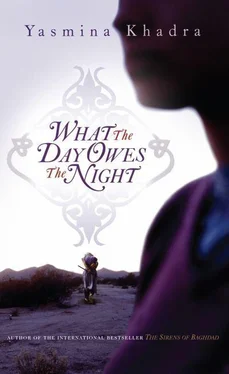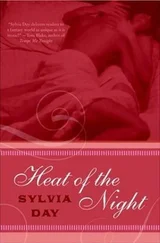‘The consumer society,’ Michel says. ‘People seem to spend their weekends shopping these days. It’s terrible, isn’t it? My wife and I come every other Saturday. If we miss a Saturday, we find we start arguing over nothing at all.’
‘Every generation has its own drugs.’
‘You’re very right, Monsieur Jonas, every generation has its drugs.’
We are now coming in to Aix-en-Provence, twenty minutes late because of an accident at the Pont de l’Arc. The weather is beautiful and the whole town seems to have shut up shop and headed for the centre. The pavements are teeming with pedestrians and the atmosphere is festive. The stone lions are standing guard around the fountain in the middle of the roundabout on La Rotonde. A Japanese man is taking his girlfriend’s photograph through the whirl of traffic. A small fairground has a flock of children crowding around a handful of attractions; children attached to bungee cords are making death-defying leaps as their terrified parents watch. The sunlit café terraces are full to overflowing, there is not a single free table; the waiters race around, trays balanced precariously. Michel lets a minibus full of tourists pass and drives slowly up the Cours Mirabeau, turning near the top on the Rue du 4 Septembre. My hotel is next to the Fountain of the Four Dolphins. A young blonde girl greets us at the reception desk and has me fill out a form, then directs me to a room on the third floor. A bellhop takes us upstairs, sets my bag down on a table, opens a window, checks that everything is in order and, wishing me a pleasant stay, disappears again.
‘I’ll leave you to take a nap,’ says Michel. ‘I’ll come back and pick you up in a couple of hours.’
‘I’d like to go to the cemetery.’
‘We’re doing that tomorrow. Today, you’re coming over to my house.’
‘I have to go to the cemetery now, while it’s still light. Honestly, I need to.’
‘Okay. I’ll call our friends and ask them to put things back an hour.’
‘Thank you. I don’t need to freshen up and I certainly don’t need a nap. We can go now if that’s all right with you.’
‘I’ve got something I need to do. Can we go in about an hour?’
‘That would be fine, I’ll be waiting downstairs at reception.’
Michel takes out his mobile phone and heads out, closing the door behind him.
He comes back an hour later and picks me up on the steps outside the hotel. I get into the car and he asks if I managed to get any rest; I tell him I lay down for a bit and feel much better now. We head down the Cours Mirabeau, still humming in the shade of the plane trees.
‘What are they celebrating?’ I ask.
‘Life, Monsieur Jonas. Aix celebrates life every day.’
‘It’s always like this here?’
‘Pretty much.’
‘You’re very lucky to live here.’
‘I wouldn’t live anywhere else. My mother used to say that the sun here almost makes up for missing Río Salado.’
Saint-Pierre cemetery, where Paul Cézanne among others is buried, is deserted. At the gates, a stone monument commemorating the French of Algeria and others who were repatriated greets me. The inscription reads: The true resting place of the dead is the hearts of the living.Tarmac pathways lead between grassy areas and ancient chapels. There are photos on some of the tombs as reminders of those who have passed away: a mother, a husband, a brother who died before their time. There are flowers on the graves and the shimmer of marble softens the harsh sunlight and fills the silence with an almost rural tranquillity. Michel leads me through the carefully laid-out paths, shoes crunching on the gravel. Grief is closing in. He stops before a grave with a black granite headstone heaped with mounds of wreaths and dazzling flowers. An inscription reads: Émilie Benyamin, née Cazenave, 1931–2008.
There is nothing more.
‘I expect you’d like to be alone for a minute?’ Michel says.
‘Please.’
‘I’ll take a little walk.’
‘That’s very kind.’
Michel nods his head gently, biting his lower lip. His grief is overwhelming. He walks away, chin pressed against his chest, hands clasped behind his back. When he disappears behind a row of red limestone crypts, I crouch down next to Émilie’s grave, clasp my hands next to my lips and recite a verse from the Qur’an. It is not Sunni tradition, but I do it all the same. In the eyes of popes and imams we are Us and Them, but in the eyes of the Lord we are one. I recite the Sura Al-Fatiha and two passages from the Sura Ya-Seen.
Then, from my pocket, I take out a small cotton purse. I untie the string and open it, slip my shivering fingers inside, take out a pinch of dried petals and scatter them over the grave; this dust is all that remains of a flower picked from a rose bush in a pot almost seventy years ago; the remains of the rose I slipped between the pages of Émilie’s geography book while Germaine was giving her her injection in the pharmacy in Río Salado.
I put the empty purse back in my pocket and get to my feet. My legs are trembling; I have to lean against the headstone. It is my own footsteps I hear on the gravel now. My head is filled with fragments of voices and fleeting images. Émilie sitting in the doorway of our pharmacy, the hood of her coat pulled up, fingers playing with the laces of her boots. I could have mistaken her for an angel come down from heaven.Émilie absently leafing through a large hardback book. What are you reading? A book about Guadeloupe. What’s Guadeloupe? It’s a French island in the Caribbean.Émilie the day before her engagement party Say yes – just say yes and I’ll call it all off. Ahead of me the path is reeling. I feel ill. I try to walk faster but I can’t. Like in a dream, my legs refuse to move; they are rooted to the spot.
There is an old man standing at the gates of the cemetery wearing a uniform decked out with medals from the war. He leans on a walking stick, dark eyes staring out of his crumpled face, and watches me stagger towards him. He does not step aside to let me pass; he waits until I come alongside him and says to me:
‘The French have left. The Jews and the Gypsies have left. There’s just you lot left in Algeria, so why are you still slaughtering one other?’
I don’t know what he is referring to or why he is talking to me like this. I can glean nothing from his face. I have a sudden flash of memory: this is Krimo. Krimo who swore he would kill me back in Río Salado. Just as I remember who he is, a searing pain shoots through my jaw; the same pain I once felt long ago when he hit me with his rifle butt.
‘Remember me now? I can tell from your face that you remember me.’
I gently push him aside and walk on.
‘It’s true, though, isn’t it? What is it with the massacres, the bombings that go on and on? You wanted independence – you’ve got it. You wanted to decide your own fate? Fine! And what have you got? Civil war, terrorists, the Armed Islamic Group. Isn’t that proof enough that all you people are good at is wrecking and killing?’
‘Please, I came to visit a grave, not to dig up the past.’
‘How touching.’
‘What do you want, Krimo?’
‘Me? Nothing . . . Just to get a good look at you. When Michel phoned to tell us the reunion had been pushed back an hour, it was like they’d postponed the Last Judgement.’
‘I don’t know what you mean.’
‘That doesn’t surprise me, Younes. Have you ever stopped to think what a tragedy your life is?’
‘I don’t want to have to listen to you, Krimo. I didn’t come here to see you.’
‘But I came to see you – came all the way from Alicante to tell you that I haven’t forgotten, and I haven’t forgiven.’
‘That’s why you dragged your old uniform and your medals out of some cardboard box rotting away in your cellar?’
Читать дальше












